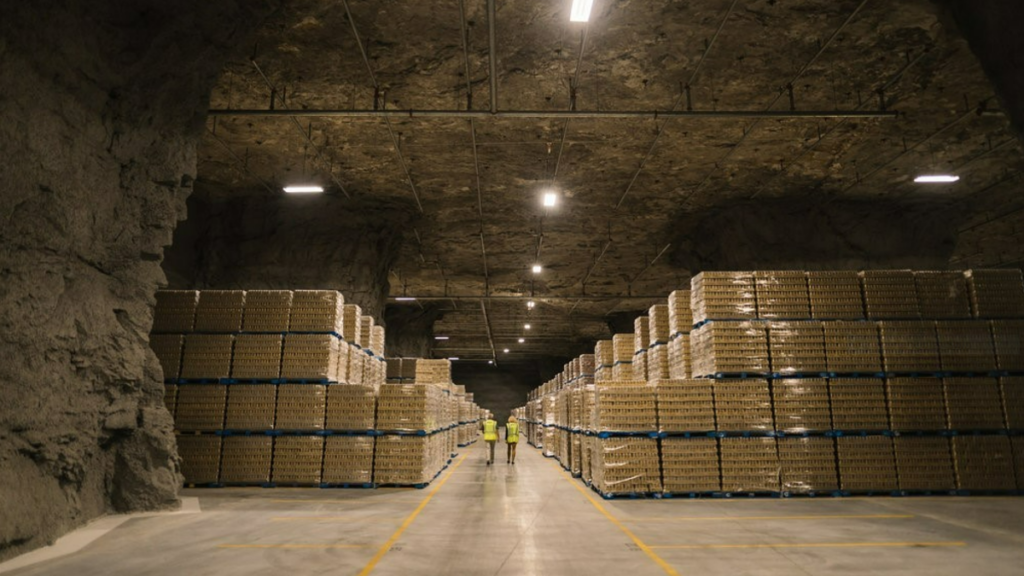A growing number of businesses call a very unique environment home. Just how unique? Well, these businesses are completely underground, in subterranean spaces that were once mines.
So, how is this possible? This happens because during the mining process, workers remove limestone by the “room and pillar” method. What this means is that workers extract the material across a horizontal plane, thereby creating horizontal arrays of rooms and pillars. As the mining tapers off, empty spaces are left behind. Starting in the 1960s, innovative entrepreneurs began rehabilitating these empty spaces for commercial use.
The even spacing of the pillars, concrete floors, and high, smooth ceilings offer time and cost efficiency for business tenants. Underground commercial space also offers security and flexibility unlike any on the market. Also, businesses don’t have to deal with the elements. This is because the spaces are all temperature- and humidity-controlled year-round.
RELATED: BUSINESS GROWTH: EXPAND OR RELOCATE
So does this give you food for thought? For example, are you looking to relocate your business?

Underground is certainly becoming big business in several areas of the country. For example, here we highlight two of the biggest underground complexes:
SubTropolis (Kansas City, Mo.)
SubTropolis was created through the mining of a 270-million-year-old limestone deposit and now offers six million square feet of rentable commercial space. This massive underground complex is completely dry, brightly lit, with miles of wide, paved streets that users access at street level. It maintains a constant temperature and humidity of 68 to 72 degrees year-round.
At one time, Ford stored its Mavericks in SubTropolis. Currently, the U.S. Postal Service stores $2 billion worth of stamps there.
Other businesses that call SubTropolis home are:
- NextPage combines the best technology, talent, and services to help solve problems, mine data, execute print, and deploy the latest communication technologies. Their aim is to provide better results for their clients by offering more efficient use of marketing dollars.
- Cerner Corporation is a supplier of health care information technology (HCIT) systems, services, devices, and hardware.
- Clore Automotive is a leader in the design, development, and manufacture of automotive service equipment for professionals and consumers.
Springfield Underground (Springfield, Mo.)
Springfield Underground is 100 feet below ground in Springfield, Missouri. It is a former limestone mine that now offers 2.4 million square feet of storage space and warehouses.
Springfield Underground maintains a constant temperature of 62 degrees. This ensures low, uniform climate control costs. Springfield Underground is cost-effective, secure, adaptable, and environmentally friendly.

RELATED: THE BEST AND WORST PLACES FOR SMALL BUSINESSES IN THE U.S.
Workers dug the first tunnels in 1954, creating the open space that would pave the way for underground facilities. The first underground building was constructed in 1960, and the second—the first refrigerated space—was added in 1962 for Kraft Foods.
Besides Kraft, two other businesses that conduct activities underground are:
- SpringNet, a division of City Utilities of Springfield, Missouri, is a fiber-to-the-business provider within Southwest Missouri.
- Graybar is a leading distributor of electrical supplies, communications, data network solutions, commercial and industrial lighting, and security equipment.
Walters Wholesale Underground & Utility Division
Obviously, subterranean spaces such as these require power and communication services. However, these and other utilities are not always readily available. This is where Walters Wholesale Underground & Utility Division comes in.
Walters Wholesale has been in operation since 1953. Its new division supplies materials for utility services to underground business spaces, offering everything these spaces require so that companies can conduct their operations efficiently. In addition, Walters Wholesale Underground & Utility Division offers an on-site manufacturing facility where they make specialty items for all underground utility needs.
